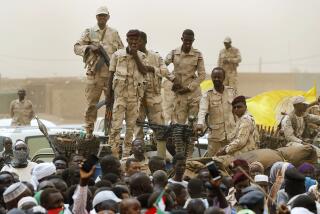New Sudan Leader Purges Military : Most Top Generals Fired; Peace Talk Resumption Pledged
CAIRO â Sudanâs new military ruler, Brig. Gen. Omar Hassan Ahmed Bashir, dismissed more than two dozen generals in a purge of the armed forces Saturday and said he will seek to resume peace talks with secessionist rebels waging a six-year-long war in the south.
Moving quickly to consolidate power following the bloodless coup that toppled the civilian government of Prime Minister Sadek Mahdi on Friday, Bashir announced the dismissal of 28 generals--virtually the entire senior command of the Sudanese armed forces--including the commander in chief, Fathi Ahmed Ali, who reportedly is also under arrest, and Chief of Staff Babu Nimir, who was said to be an ally of the ousted prime minister.
Reports from the Sudanese capital of Khartoum said the city remained calm Saturday, with no outward signs of resistance despite what had been initial fears that some of the large and well-armed militias controlled by Sudanâs now disbanded political parties might try to oppose the military takeover, which ended three years of democratic but chronically disorganized rule in the largest nation in Africa.
Troops Patrol City
Diplomats in Khartoum said that troops continued to patrol the city, manning roadblocks and checkpoints at key intersections. Telex and telephone communications, cut immediately after the coup, were restored, but Khartoum airport remained closed to most air traffic.
A state of emergency also remained in force, with Radio Omdurman, the state broadcasting service, warning that violators of a nighttime curfew in the capital risked being shot on sight.
Egypt, Sudanâs northern neighbor and the Arab country with the largest strategic stake in stability in Khartoum, cautiously welcomed the new regime, with editorials in Cairoâs state-run press focusing on the political anarchy, sectarian tensions, corruption and economic mismanagement that were endemic to Mahdiâs hapless government.
Chad, another neighbor, also welcomed the change, but there was no immediate reaction from Libya, whose increasing military presence in Sudan was a major factor behind what has been a steady deterioration of Egyptian-Sudanese relations since Mahdi came to power.
Bashir, who in the wake of the coup appointed himself prime minister, defense minister and armed forces commander, is said to be pro-Egyptian, having done some of his military training here.
It is still not clear, more than a day after the pre-dawn coup, who the other members are of a new 15-man Revolutionary Command Council set up to govern Sudan. But, like Bashir, they are said to be mostly middle-ranking officers dissatisfied with the Mahdi governmentâs political paralysis and seeming inability to negotiate an end to the bloody war in the south against rebels from the Sudanese Peopleâs Liberation Army.
Bashir, meeting Saturday with Cabinet undersecretaries, sharply criticized Mahdiâs ambivalent approach toward peace talks and said that he will launch a new initiative aimed at reaching an accord with the rebels, Radio Omdurman said.
âOur primary goal is peace. We (the army) are the people most suffering from war, and I will enlist the help of all experts in the quest for peace,â the radio quoted him as saying.
He said that a referendum could determine whether Sudan should have Islamic law, or sharia , which has been a key issue in the civil war.
The civil war, pitting the Christian and animist-dominated south against the Muslim north, has made millions homeless, ruined the Sudanese economy and caused untold suffering by preventing relief supplies from reaching the famine-stricken south.
Last February, the military issued a public ultimatum demanding that Mahdi either make peace with the rebels or give the armed forces the means to win the war. The prime ministerâs faction-ridden government appeared unable to do either, however, and this paralysis was seen by most observers as the key factor leading to his downfall.
It was still not clear what had happened to Mahdi, who was elected premier three years ago when another military regime stepped down after overthrowing President Jaafar Numeiri in a 1985 coup.
Some reports said that Mahdi had been arrested, along with most of the other senior members of his government. But other reports suggested he had escaped, possibly to Libya. The new government remained silent on his fate.
Throughout the day, Radio Omdurman broadcast what it said were messages of support for the new government from army units stationed across the country.
Little about Bashir was known to outsiders before the coup. But according to details now emerging about his background, he is a 43-year-old paratroop commander who achieved a measure of fame as the hero of a major victory over rebels at the town of Mayoum.
He is a Muslim and a northerner of Arab extraction who, according to reports in the Egyptian press, studied in the Soviet Union but is considered to be anti-communist.
His elder brother, who lives in the United Arab Emirates, was quoted by Persian Gulf newspapers Saturday as saying that Bashir was an admirer of Gen. Abdul-Rahman Swareddahab, the former defense minister who overthrew Numeiri in 1985 and ruled for one year before stepping down in favor of a democratically elected government headed by Mahdi.
More to Read
Sign up for Essential California
The most important California stories and recommendations in your inbox every morning.
You may occasionally receive promotional content from the Los Angeles Times.










